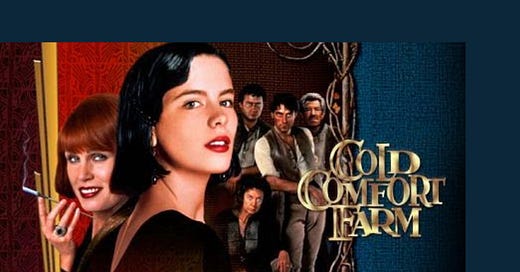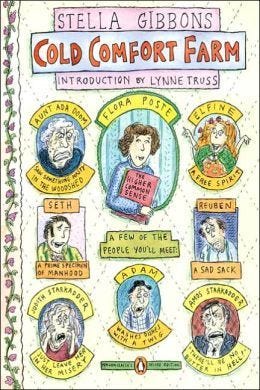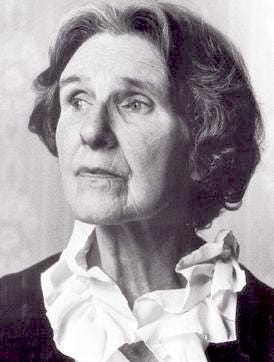Why I ❤️ "Cold Comfort Farm" by Stella Gibbons
The Books We ❤️ Club welcomes S.E. Reid of Talebones and The Wildroot Parables
When
(aka Sally) mentioned Cold Comfort Farm I admit I was probably conflating Cold Mountain and The Road to Wellville in one of those swirling, peripheral portmanteaus of a mind accustomed to seeing far more advertisements for movies than it can ever actually watch. 1990s? Cold? Rural? Check.Turns out it was a movie in 1995, and it was a comedy, and as I began reading more about it, I felt a familiar thrill running up my spine, that knowing you get when something sounds like exactly your cup of tea. Cozy, kooky, pastoral—yes, please!
And Sally would know. Add in generous heapings of horror and the supernatural, and you’re in the imaginary country she’s created, Ferris Island, the Pacific Northwest setting of many of her short stories—including the wonderful collection The Orchard Hounds and Other Stories which I just finished and highly recommend!—and her more recently published novella, Ivy & Ixos.


I’m thrilled to welcome Sally—one of the great mainstays of Fiction Substack with her bi-monthly Talestack News digest—to write about Stella Gibbons’ beloved and quirky masterpiece in this month’s edition of The Books We ❤️ Club.
Happy reading! ~ MTF
The Books We ❤️ Club—the book club you don’t actually have to read the book, leave the house, or even change out of your jammies to enjoy—as writers sing the praises of books that reach into our hearts.
We invite you to add your own reactions, insights, and ideas in the Comments for an impromptu book club session. Share your favorite quotes, characters, moments, and surprises in discussion with other passionate readers.
(And if you’d like to feature your favorite book in a future edition, DM me.)
NEXT TIME: “Why I ❤️ Akwaeke Emezi”
by of Holly Starley’s Rolling Desk and
Why I ❤️ Cold Comfort Farm by Stella Gibbons
by of and
An Odd Little Treasure
“The education bestowed upon Flora Poste by her parents had been expensive, athletic, and prolonged; and when they died within a few weeks of one another during the annual epidemic of the influenza or Spanish Plague which occurred in her twentieth year, she was discovered to possess every art and grace save that of earning her own living.”
On that appropriately morbid and pragmatic note, so begins Cold Comfort Farm by Stella Gibbons, a satirical novel nearly a century old that has been with me—in some form or another—for so long that I can scarcely remember a time when it wasn’t a beloved but bizarre fixture in my childhood landscape.
And when I say bizarre, I mean bizarre. Cold Comfort Farm is a strange book. While the plot is relatively straight-forward, the humor (mostly) holds up since its original publication in 1932, and the characters and caricatures are so colorfully drawn that they will stick with you forever…there are some unusual threads in it, too. Like the author’s insistence on setting it “in the near future” and adding random science fiction elements to it? Or the occasional absurdist, almost cartoonish moments? Or the self-referential addition of asterisks next to certain descriptive paragraphs?
Cold Comfort Farm is an odd little treasure, and it’s a book I love.
So let’s talk about it.
Robert Poste’s Child
Cold Comfort Farm is the story of Flora Poste, age nineteen, who suddenly finds herself orphaned (not a great loss for her emotionally; her parents were always a bit distant) and must navigate the world on very little resources. While her best friend Mary insists that Flora should get a job and her own flat, Flora has other ideas. She would rather mooch off of relatives while she gathers life experiences as material for the novel she plans to write. She sends appeal letters to as many relatives as she can, and the most intriguing response comes from her cousin Judith Starkadder out at Cold Comfort Farm in Sussex, a branch of the family she’s never met:
“Child, my man once did your father a great wrong. If you will come to us I will do my best to atone, but you must never ask me what for. My lips are sealed.
“We are not like other folk maybe, but there have always been Starkadders at Cold Comfort, and we will do our best to welcome Robert Poste’s child.”
Fascinated by the mysterious letter and armed with her common sense, insistence on good manners, and penchant for tidying messes, off Flora goes to live with the Starkadders.
Hilarity, as they say, ensues.
My First Introduction
I confess, I first fell in love with this story as a movie.
The film adaptation of Cold Comfort Farm was released in 1995 and has an absolutely stacked cast of British heavyweights, headed up by Kate Beckinsale as Flora. It quickly became one of those “family movies” that we watched regularly and quoted constantly in everyday conversation.
I finally picked up the book for the first time in my late teens and was pleased to discover that the book and movie are very similar. The movie took a few liberties, as movies often do, removing or combining a few extraneous minor characters and shuffling some of the plot points around. It also did away with some of the more absurdist elements, which we’ll discuss later. But the spirit of the book is truly alive in the movie, and I can only recommend it.
That said, the book has its own deep place in my heart, one that grows every time I read it.
The Rural Novel
For a bit of literary context, Cold Comfort Farm is a sharp parody of a specific type of novel popular in the era between the two World Wars, which is where so much of its incisive humor comes from. Ironically, these “rural novels” have mostly been lost to obscurity while Cold Comfort Farm lives on.
Some hallmarks of the rural novel in its heyday were a heaping helping of purple prose, a whole lot of melodrama and emotionality, and romance of the earthy “fecund” variety. Gibbons took this general formula and played into it while turning it on its head, giving us plenty of purple prose (but letting us know when it’s happening with asterisks beside the offending paragraphs), melodrama so heavy that it becomes hilarious, and letting the “earthy romance” characters find their true passions in life (hint: not sex).
And no one is safe. Gibbons makes merciless fun of the out-of-touch upper crust and the salt-of-the-earth peasant folk just the same. She even makes fun of herself by addressing the book’s foreward to a fictional mentor and falling all over herself in gratitude to him.
While Cold Comfort Farm can feel like a silly little comedy on its surface—and it is deeply funny and very quotable—it carries some surprisingly weighty themes touching on class, gender, sexuality, religion, and power dynamics. The book is full of strong and wise women of various types and stripes, from Flora herself and her fiercely independent best friend Mary to the Starkadder women, especially Great Aunt Ada Doom, the mysterious figure who runs the farm with an iron fist. Gibbons also brings the more harmful aspects of masculinity in for a kicking, especially with the hell-and-damnation preaching of Cousin Amos, the obsessive fawning of Mr. “Mybug”, and the oversexed behavior of Flora’s second cousin Seth. In some ways, it was quite ahead of its time.
Flora Poste is the perfect protagonist for this type of story. It’s hard to call her truly likeable, but her uptight personality is an engaging motivator through the narrative. She’s driven by a need to clean up everyone’s messes and truly has no idea what she’s getting into with the Starkadders and their mayhem. She’s intelligent, educated, and compelling, but flawed. She sums herself up perfectly in this comment to her friend Mary, “On the whole, I dislike my fellow-beings; I find them so difficult to understand. But I have a tidy mind, and untidy lives irritate me.”
All of the characters’ sins, flaws, and messy behaviors are examined against Flora’s machinations for tidiness, and softened or strengthened as necessary before the conclusion of the book—including Flora’s own. But because I want you all to read this for yourself, you won’t find any spoilers here. As Cousin Judith wrote in her letter: “My lips are sealed.”
The Weird Bits
I mentioned it in the introduction, and here I repeat: the book is also a bit weird.
Let’s start with the science fiction stuff. Into this perfectly normal period piece that could very easily be set in the 1930s, Gibbons throws occasional mentions of concepts that shouldn’t exist. A dance club in the city made entirely of glass. A video phone that Flora uses to call someone. An offhanded statement that no one uses the train anymore in this story’s universe and everyone only flies here and there, even when traveling domestically in England. (Though Flora is forced to take the train to Sussex, because it’s Sussex and therefore terribly backward.)
There are also some cartoonish moments, like a character being flung around—like, literally flung into the air—by the tossing of a horse’s head when the character is holding the reins. Or a cow randomly losing a leg, but without any real harm or pain to the animal, somehow. (This one always gets me, I have no idea why.)
I like the surreal nature of the book. I think it serves to underline the futuristic sensibilities of Flora and her city friends and the loamy obstinance of the Starkadders who live in their own version of the past. While the family is given some truly vicious quirks, there’s compassion to be found in the depiction of them, too.
In this book, all are human, both in flaw and in virtue. This, I think, is a fascinating glimpse into the author’s own psyche.
Stella’s Curse
I don’t know everything there is to know about Stella Gibbons as a writer, but what I do know fascinates me.
She was trained as a journalist back in a time period when it was uncommon for a woman to make money using her wits. She was clearly very smart and independent, and came from an eccentric family background. It has been said by some that Cold Comfort Farm is a bit of an exorcism for Gibbons’ own familial ghosts. I could believe it, and it’s probably what makes the book so enduring.
But in this, I feel a bit of writer-to-writer empathy for Stella. Cold Comfort Farm was not the only novel she published, but it’s far and away the most long-lasting...much to her chagrin. I’ve read one or two of her other novels and they aren’t badly written at all, but they miss so much of the charm and humor that she managed to capture in her most popular book.
In the end, I’m not sure how much love she retained for Cold Comfort Farm over the years, since it was one of her earliest books and she—like every artist—longed to grow, evolve, and progress. It’s to her credit that she refused to be a one-hit-wonder, and a large body of her work (twenty-three novels in all, not to mention short fiction and poetry) was written in spite of the fans who clamored solely for Cold Comfort Farm sequels.
Stella’s desire was never to be trapped, pigeon-holed, or told how to conduct her career as a novelist, even if she sacrified quite a bit of mainstream popularity in the process. I hope, in the end, she was satisfied.
The Art of Empathy
In her introduction to the 2006 edition of the book, author and journalist Lynne Truss says that Stella Gibbons “placed great value on ‘detachment’ as a writerly virtue.” In Flora Poste, we find Gibbons’ own detached confusion about how to relate to people, especially the most messy and unkempt people in our lives. And yet, Gibbons doesn’t “write off” the Starkadders. Instead—through Flora—she unearths their deepest wants and needs, and allows those flawed characters to reach for them.
Ultimately, despite their bad manners and bizarre habits, they are not doomed.
This empathy is the power of good storytelling, and it’s why Cold Comfort Farm inspires me. We are laid bare by the use of sharp humor, satire, parody, and farce. In the mirror of these tools we are shown our weaknesses, and allowed to drop our masks. The motley characters of Cold Comfort Farm initially feel like actors on a stage, handed the script of the cliche rural novel, each commanded to play their roles. Trapped in caricature. Until Flora arrives to remove the scripts and let them live the lives they want to live, reach for something they never thought they could have. She is an imperfect savior, wielding washed bedroom curtains, a little mop with a handle, and “the higher common sense” as her gospel.
This, I believe, is why the story endures. Not because of its inimitable humor or its dire quotability, but because of its ultimate empathy for some truly unusual people. An unlikely redemption.
And thank goodness for that. Because we’re all just a little bit untidy, aren’t we?
And maybe—just maybe—if there’s hope for the Starkadders, there’s hope for us yet.














Many thanks, Sally, for this wonderful treatment of my newest old book I can't wait to read!
Thank you for giving me the opportunity to yap about one of my faves, Troy! ♥ I'm so glad I got to share this delight of a story with the world's coziest book club!